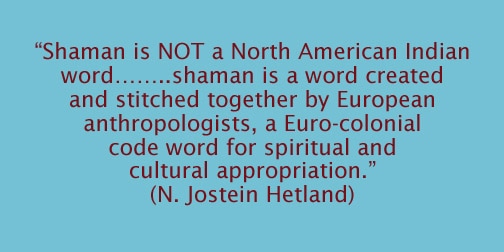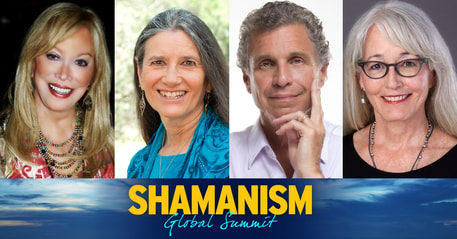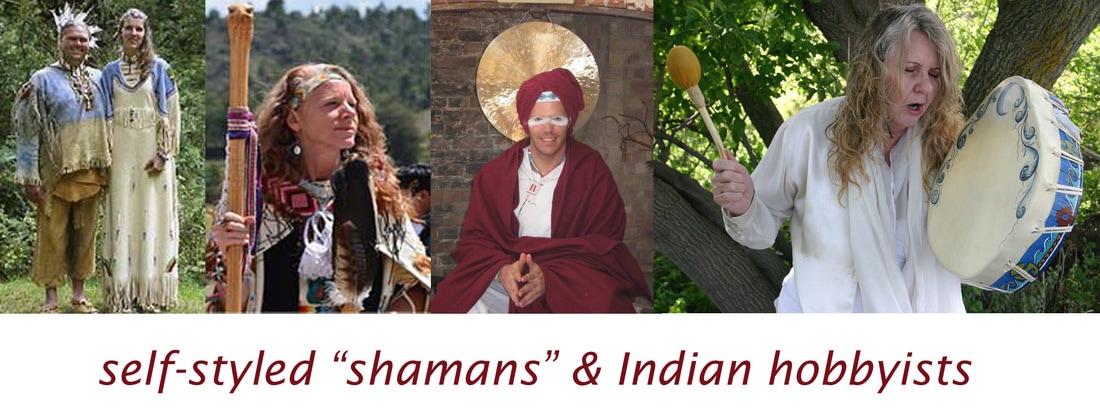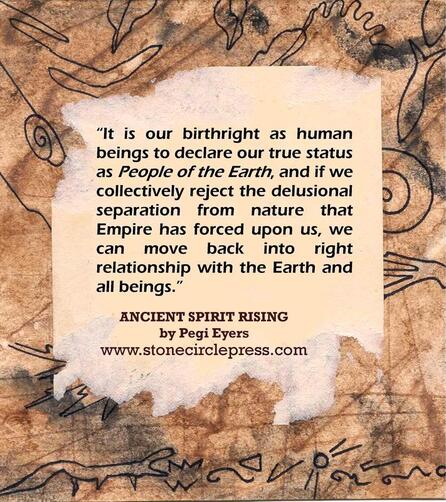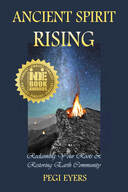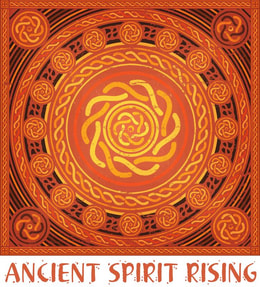To understand how cultural appropriation shows up in our environmental movements and spiritual life, we need to look at the backstory, or how cultural appropriation came to be. About 50 years ago a strange phenomena began to happen. In mainstream society young white people were rebelling against the imperialist machine, while in a much less visible sphere, First Nations were just starting to recover from the dark ages of genocide, oppression, residential school displacement and segregation. In the dominant society of the mid-20th century, ties to a genuine spiritual life had been broken, organized religion was on the decline, and all of a sudden young white people were reconnecting with nature. This was a wonderful thing (!) but they had no role models to follow. So they turned to First Nations, freely adopting their cultural tools and spiritual traditions, and some going so far as to create a whole new Indigenous identity for themselves. Without proper boundaries, the whitewashed genre of "Native Spirituality" was born, and cultural appropriation became imbedded in the flourishing New Age Industry.
Of course we owe a huge debt to the original rebellion of the hippies and the counterculture that gave us the alternative choices, sexual freedom, new spiritualities, holistic self-care, and healthy life-sustaining practices we enjoy today. These are features of society we take for granted, but unfortunately within the massive self-help, transformational and New Age marketplace the genres of “Native Spirituality” and “Shamanism” have been normalized. Being exposed to this material for so long, many New Agers and Pagans are shocked to find these genres being questioned, yet an interrogation is exactly what is needed. Not only are the white practitioners of "Native Spirituality" on shaky moral ground, First Nations have made it abundantly clear that they are completely opposed to any theft of their cultural and spiritual property.
Today, cultural appropriation occurs on a continuum from relatively harmless practices, to serious mental disorders such as identity theft found in the worlds of entertainment, literature, self-help and spirituality. Having moccasins, native jewellery, native art, or a drum in the privacy of your own home (acquired from native artisans) can be considered good Allyship by supporting the livelihood of First Nations. But on a larger scale, in mainstream industries like fashion, fine art, entertainment and home décor, items like dreamcatchers and headdresses are big business, and these cultural signifiers are casually and carelessly used by white people for fun and self-expression. Many of these symbols, often products made in China, are the sacred property of First Nations! We can just imagine how deeply hurtful this must be.
 It's just fashion, why are you so upset?
It's just fashion, why are you so upset?
At the far end of the cultural appropriation continuum, identity theft is by far the most serious problem. White people who have a superficial understanding of traditions held by Indigenous people for millennia create a fake native identity for themselves, and then offer spiritual services and ceremonies following the business model of consumer capitalism. Spiritual guidance is not part of the economic structure within traditional First Nation societies, so this is the first boundary (among others) to be breached. The phenomena of the self-styled "Shaman" charging big bucks for ceremonies and other quasi-native experiences, is shockingly reprehensible and morally wrong.
Contemporary Shamanism was first adopted by the early anthropology and New Age communities, and as we unpack these movements today, we see that the contemporary "Shamanism" genre is based on intrusive and homogeneous European interpretations. And yet the title of “Shaman” to describe one’s practice is now so widespread, it is no doubt impossible to send it back to the Pandora’s Box from whence it came. The origins of the term “shaman” first appeared in the 1914 reports of American ethnologists to describe the practices of the Evenki-speaking Tungusian and Samoyedic tribes of eastern Siberia, and it can be argued that only practitioners from those specific societies have the right to use the term.
Fabricating a fake native identity is a continuation of Settler-Colonialism, which (1) seeks to eradicate indigenous people, (2) seize the land and resources, and (3), erase the cultural identity of the indigenous people themselves. And when we consider the phenomena of cultural appropriation on a deep level, we see that the activity of white wannabees or pretendians is not harmless or “spiritual” – it is an act of the deepest racism. The cultural markers white folks are drawn to, like drums, pipes and sweatlodges, are the very same things that were outlawed by the colonial powers. What white people freely use in their everyday lives are objects First Nations could be killed for using, not that long ago. What could be more macabre?
Cultural appropriation is an enormous widespread problem that interferes with First Nations resurgence and sovereignty. More than just the lifting of ideas, practices and physical objects, cultural appropriation dominates how oppressed groups present themselves to the world, and undermines their efforts to preserve their own traditions. Not to mention the disempowerment and loss of basic human dignity this suggests, Indigenous people no longer have their own autonomy or control over how they are represented in the public domain, which is a fundamental right for every human being. When white academics, scholars, writers, New Agers and Pagan practitioners (those with advantage and power) appropriate, write or teach about the cultural and spiritual traditions of indigenous societies, they are in fact dominating the original indigenous knowledge (IK). Their versions of IK become the valid narratives, fabrications that are sold back to the white majority, and even to Indigenous peoples themselves.
In response to the white seeker's claim of having "permission" from one First Nations person to use their spiritual or cultural property, it doesn't follow that the rest of that FN community agrees. By going ahead and using FN spiritual or cultural property as a non-native person, you are (a) still going to look ridiculous, (b) appear to be "tokenizing" by separating out one FN's opinion from their wider community, (c) are still indulging in racist and colonizing behavior, and (d) are showing that you have no clue what your own cultural identity is. Beyond the universal tools found in nature to make fire and shelter, and regional wild foods that are going to be similar whatever culture you belong to, it is best to recover the indigenous practices of your OWN ancestry.
There is one simple Rule – ask yourself if the cultures are on a level footing, and if one culture is freely sharing with another, or is there an oppressor/oppressed relationship, and is the oppressor taking from the oppressed? With the history of Settler-Colonialism on Turtle Island, identity theft is the final link in the chain of cultural genocide. Cultural appropriation is made possible by white supremacy and systemic racism.
What does cultural appropriation say about our own identity as white people?
In the massive Empire-building project on Turtle Island, our ethnocultural identity was stripped from us as we joined the homogeneous nation-states of Canada and USA with whiteness as the default. Colonized for centuries now, white people have forgotten why having an ethnoculture is important, yet we yearn for it at the same time. This collective soul loss is at the root of our attraction to Indigenous societies and the exotic "other." We may exist in the cultural vacuum known as Settler-Colonialism, but Turtle Island Indigenous Knowledge is not our culture!
The popularity of New Age Capitalism has allowed us to use the spiritual property of Indigenous people without realizing that it is cultural appropriation. Boundaries should have been in place years ago, but the timetable of healing from genocide and slavery did not enable people of color to be empowered to speak out on this serious issue until recent times. Now that white people are aware of the problem, we are obligated to educate each other and stop these harmful practices.
Even if the false “shamanic” identity has been perpetuated for years and the practitioner has an established business, they need to stop aligning with the racist policies of colonialism and white knowledge domination. Shifting to the authentic earth-connected wisdom traditions of one’s own ancestors and offering that European Indigenous Knowledge (EIK) to one’s cultural group is not all that difficult, and would be a blessing to all involved. So-called “shamans” have re-created themselves once, and can do it again (!) this time using their own true identity and ethnicity, and their followers will love them for it. In fact, with the millions of spiritually-starved and culturally-alienated diasporans in the Americas, it is inconceivable that those focused on spiritual and cultural renewal would not see the value in offering their own authentic EIK teachings to others!
When First Nations people are telling us over and over that cultural appropriation is demeaning and disempowering (as well as a continuation of Settler-Colonialism), we really need to rearrange our ethical maps and stop this offensive behavior. In grappling for the shiny treasures we lack in our own lives, we have forgotten the basic values of honour and respect.
MEGA-RESOURCES FROM A-Z
Aldred, Lisa. “Plastic Shamans and Astroturf Sun Dances: New Age Commercialization of Native American Spirituality.” The American Indian Quarterly, University of Nebraska, 2001
Battiste, Marie and James Youngblood Henderson. Protecting Indigenous Knowledge and Heritage: A Global Challenge. Purich Publishing, 2000
Bell, Diane. Some Readings on Cultural Appropriations, Native America, and the New Age. Holy Cross College, 1996 www.hanksville.org
Berkhofer, Robert F. The White Man's Indian: Images of the American Indian from Columbus to the Present. Vintage, 1979
Bird, S. Elizabeth (editor). Dressing in Feathers: The Construction of the Indian in American Popular Culture. Westview Press, 1996
Brant, Beth. “Anodynes and Amulets.” Writing as Witness: Essay and Talk. Three O'Clock Press, 1995
Brascoupe, Simon and Howard Mann, PhD. A Community Guide to Protecting Indigenous Knowledge. Indian and Northern Affairs Canada, June 2001
www.publications.gc.ca
Brown, Michael F. Who Owns Native Culture? Harvard University Press, 2004 Also, online resource for debates on the legal status of indigenous art, music, folklore, biological knowledge and sacred sites. http://web.williams.edu
Carroll, Al. “Tribe of Many Colors or Tribe of Many Dollars?” Racial Justice, IMC Network, January 11, 2011 www.indybay.org
Champagne, Duane (editor). Contemporary Native American Cultural Issues. AltaMira Press, 2013
Cook-Lynn, Elizabeth. "Who Gets to Tell the Stories?" Wicazo Sa Review: Native American Literature on the Edge of a New Century, Volume 9, Number 1, 1993
Dashú, Max. “Respect and Responsibility.” La Gazette, Santa Cruz, October 1994. www.suppressedhistories.net
Declaration of War Against Exploiters of Lakota Spirituality. 500 representatives from 40 different tribes and bands unanimously passed this declaration at the Lakota Summit V, a gathering of Lakota, Dakota and Nakota Nations from the U.S.A. and Canada, June 10, 1993 www.aics.org
Deloria, Philip J. Playing Indian. Yale University Press, 1999
Donaldson, Laura E. “On Medicine Women and White Shame-ans: New Age Native Americanism and Commodity Fetishism as Pop Culture Feminism.” Signa: Journal of Women in Culture and Society, 1999
Doxtator, Deborah. Fluffs and Feathers: An Exhibit on the Symbols of Indianness. Woodland Cultural Centre, Brantford, ON, 1992
Egan, Timothy. Short Nights of the Shadow Catcher: The Epic Life and Immortal Photographs of Edward Curtis. Houghton Mifflin Harcourt, 2012
EONM (Eradicating Offensive Native Mascotry). Grassroots organization dedicated to awareness and mobilization to combat the public misappropriation of Native American imagery, and calling out entities complacent with, or profiting directly from this racism. Education and action on history, current events, public relations and social media tactics, 2015 http://eonm.org
Eyers, Pegi. “Beyond the Pale: Lifting IK and Inventing Identity.” Bringing Race to the Table: An Exploration of Racism in the Pagan Community. Brandy Williams, Taylor Ellwood and Crystal Blanton (editors), Megalithica Books, 2015
F.A.I.R. MEDIA (For Accurate Indigenous Representation). “Indigenous Peoples reserve the right to define how and where we are represented in popular culture. F.A.I.R. provides a safe, secure venue by and for Indigenous Peoples to confront stereotypes, while at the same time promoting accurate representations of ourselves in popular culture,” 2015 www.facebook.com
Francis, Daniel. The Imaginary Indian: The Image of the Indian in Canadian Culture. Arsenal Pulp Press, 1992
Gehl, Lynn, PhD (Gii-Zhigaate-Mnidoo-Kwe). The Indigenous Knowledge Protection Act. Community resources and links, website, 2015
www.lynngehl.com/my-indigenous-knowledge-protection-act.html
Geismar, Haidy. Treasured Possessions: Indigenous Interventions into Cultural and Intellectual Property. Duke University Press Books, 2013
Graber, Christoph Beat and Mira Burri-Nenova (editors). Intellectual Property and Traditional Cultural Expressions in a Digital Environment. Edward Elgar Publishers, 2008
Green, Rayna. “The Tribe Called Wannabee: Playing Indian in America and Europe.” Folklore 99, No. 1, 1988
Hagan, Helene E. “The Plastic Medicine People Circle,” Institute of Archetypal Ethnology Newsletter, September, l992
Harney, Corbin. “Spiritual Phonies.” The Way It Is: One Water, One Air, One Mother Earth. Blue Dolphin Publishing, 2009
Hemachandra, Ray A. “Selling the Sacred? American Indians and the New Age.” New Age Retailer, November/December 2003
Hobson, Geary. “The Rise of the White Shaman as a New Version of Cultural Imperialism.” The Remembered Earth: An Anthology of Contemporary Native American Literature. Geary Hobson (editor), University of New Mexico Press, 1981
Huhndorf, Shari M. Going Native: Indians in the American Cultural Imagination. Cornell University Press, 2010
IPinCH: Intellectual Property Issues in Cultural Heritage - Theory, Practice, Policy, Ethics. “The IPinCH research project is an international collaboration of archaeologists, indigenous organizations, lawyers, anthropologists, ethicists, policy makers and others concerned with the theoretical, ethical, and practical implications of commodification, appropriation, and other flows of knowledge about the past, and how these affect communities, researchers and other stakeholders.” Simon Fraser University, 2015
www.sfu.ca/ipinch
Jean, Terri. “Selling Native Spirituality.” Blue Corn Comics: New Age Mystics, Healers and Ceremonies, 2007 www.bluecorncomics.com/newage.htm
Jenkins, Philip. Dream Catchers: How Mainstream America Discovered Native Spirituality. Oxford University Press, 2004
Johnson, Myke. “Wanting To Be Indian: When Spiritual Searching Turns into Cultural Theft.” Unsettling America: Decolonization in Theory & Practice, September 20, 2011 http://unsettlingamerica.wordpress.com
Keene, Adrienne. Native Appropriations: Examining Representations of Indigenous Peoples. Online resources and blog focusing on issues of cultural appropriation and stereotyping, 2015 http://nativeappropriations.com
www.facebook.com/nativeappropriations
Kehoe, Alice. Shamans and Religion: An Anthropological Exploration in Critical Thinking. Waveland Press, 2000
Kehoe, Alice. "Primal Gaia: Primitivists and Plastic Medicine Men." The Invented Indian: Cultural Fictions and Government Policies. James Clifton (editor), Transaction Publishers, 1990
Lischke, Ute and David T. McNab (editors). Walking a Tightrope: Aboriginal People and Their Representations. Wilfrid Laurier University Press, 2005
Meyer, Carter Jones and Diana Royer (editors). Selling the Indian: Commercializing and Appropriating American Indian Cultures. University of Arizona Press, 2001
My Culture is Not a Trend: A Dialogue About Cultural Appropriation (blog), 2013
>link<
NAFPS (New Age Frauds and Plastic Shamans). Anti-racism forum, resource and watchdog site for investigating, outing and warning the public about impostors, exploiters, cultural appropriators and pseudo "shamans." Maintained by First Nations scholars, activists and their allies, 2015 www.newagefraud.org
Our Red Earth. Death Among Us: Observations On Internet Exploiters Of American Indian Spirituality. Our Red Earth Organization, 2000 www.oocities.com/ourredearth/index.html
Owen, Suzanne. Appropriation of Native American Spirituality. Continuum, 2011
Root, Deborah. Cannibal Culture: Art, Appropriation & the Commodification of Difference. Westview Press, 1996
Rose, Wendy. "The Great Pretenders: Further Reflections on White Shamanism." The State of Native America: Genocide, Colonisation and Resistance. M. Annette Jaimes (editor), South End Press, 1999
Scafidi, Susan. Who Owns Culture? Appropriation and Authenticity in American Law. Rutgers University Press, 2005
Shanley, Kathryn W. “The Indians America Loves to Love and Read: American Indian Identity and Cultural Appropriation.” American Indian Quarterly, Volume 21, Number 4, 1997
Specktor, Mordecai. “Shamans or Charlatans? Do Some Teachers of Native American Spirituality Distort Indians’ Culture?” Utne Reader, July/August 1989
Strom, Karen M. A Line in the Sand. Online resource for cultural appropriation, cultural property issues, stereotypes and cultural sovereignty, 1996 – 2015 www.hanksville.org/sand
Strong, Pauline Turner. American Indians and the American Imaginary: Cultural Representation Across the Centuries. Paradigm Publishers, 2013
Sunder, Madhavi. From Goods to a Good Life: Intellectual Property and Global Justice. Yale University Press, 2012
United Nations. Declaration on the Rights of Indigenous Peoples. Adopted by the General Assembly September 13, 2007. View or download the full declaration at the United Nations Permanent Forum on Indigenous Issues website. http://www.un.org/esa/socdev/unpfii/documents/DRIPS_en.pdf
www.un.org/esa/socdev/unpfii/documents/DRIPS_en.pdf
Waegner, Cathy Covell (editor). Mediating Indianness. Michigan State University Press, 2015
Wallis, Robert J. Shamans/Neo-Shamans: Ecstasies, Alternative Archaeologies and Contemporary Pagans. Routledge, 2003
We Are a People: Not Your Mascots. Non-profit organization dedicated to addressing the misappropriation of indigenous identity and imagery through the acceptance of mascots, stereotypes and racist behavior, 2015
www.notyourmascots.org
Wernitznig, Dagmar. Going Native or Going Naive? White Shamanism and the Neo-Noble Savage. University Press of America, 2003
Win, Wambli Sina (Lakota), “The Red Road is Not For Sale,” The Native Times, March 2011.
York, Michael. “New Age Commodification and Appropriation of Spirituality.” Journal of Contemporary Religion, Vol. 16, No. 3, 2001
Young, James O. and Conrad G. Brunk (editors). The Ethics of Cultural Appropriation. Wiley-Blackwell, 2012
Ziff, Bruce and Pratima V. Rao (editors). Borrowed Power: Essays on Cultural Appropriation. Rutgers University Press, 1997
| Pegi Eyers is the author of "Ancient Spirit Rising: Reclaiming Your Roots & Restoring Earth Community," an award-winning book that explores strategies for uncolonization, rejecting Empire, social justice, ethnocultural identity, Apocalypse Studies, building land- emergent community & resilience in times of massive change. |
Sections workshopped on Canadian Ecopsychology Network
(CEN ~ March 23, 2017), and published on
Unsettling America ~ April 26, 2017

